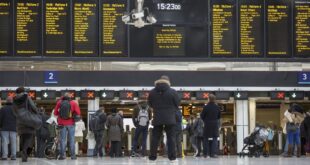West Midland Trains workers escalate fight against strike-breaking operation
By
Michael Barnes
23 November 2019
Conductors working for West Midlands Trains (WMT) are to strike again today after mounting pickets last Saturday at train stations across the region. Today’s stoppage is the second of a planned eight 24-hour strikes.
The conductors are fighting moves to remove them from trains, as the company seeks to impose driver only operation (DOO) trains. Over 600 conductors voted by a majority of nine to one to strike in a ballot by the Rail, Maritime and Transport workers union (RMT).
WMT is a private rail franchise owned by the Netherlands transport giant Abellio that runs transport services across Europe and employs thousands. In the UK they also run East Midlands Railway, Greater Anglia, Merseyrail, ScotRail and Abellio UK Bus. At each franchise the conductors’ role has been degraded or is under major attack.
The WMT strike is the latest in an almost four-year battle by workers at the UK’s private rail franchises to forge a unified struggle between drivers and conductors and resist the imposition of DOO operations over the entire rail network. In 2014, the Conservative government adopted Lord McNulty’s recommendations to cut 20,000 jobs, impose pay cuts, and productivity drives and that “the default position for all services on the GB Rail network should be DOO …”
Conductors and drivers at South West Railways covering South West England are set to begin a month-long strike on December 2 to oppose the introduction of new DOO trains. If it goes ahead it will be the longest continuous rail strike in UK history.
A strike was set to go ahead by drivers on the Victoria line of the London Underground November 27 was suspended Friday by the RMT. Another strike on former Virgin Train services, now run by Stagecoach, was called off by the RMT after a sacked train manager (conductor) was restored.
These struggles are part of a global wave of transport strikes.
In India, almost 50,000 Telangana State Road Transport Corporation (TSRTC) workers are striking against privatisation and for improvement in their brutal working conditions and miserable pay. The strike has crippled public transport in the state of Telangana and this week was the seventh week of action as workers confront the employer’s threat of mass sackings.
Canadian National (CN) railway’s 3,200 conductors, train operators and yardmen entered their fourth day on strike Friday against the giant transport company. The strikers are fighting to end CN’s gruelling and unsafe work and scheduling practices.
WMT covers Crewe, Birmingham, Coventry, Wolverhampton, Northampton, Bletchley and Watford Junction on the West Coast mainline into London Euston. Over 600 conductors mounted effective pickets. They were bolstered as large numbers of driver colleagues, members of the ASLEF union, refused to cross picket lines. Although company spokesmen said they cancelled half the service, the rest ran with a strike-breaking workforce of managers “trained” up as conductors.
Pickets reported to the WSWS significant public support for the strike, with people speaking of their horror at the thought of DOO trains.
Not only does Abellio, backed by the Tory government, want to remove door operations from the conductor—that currently allows drivers to concentrate on signals—they are seeking to impose door controls over the driver. Abellio have already agreed with the RMT to enter “productivity” negotiations with a list of demands designed to remove historic gains—such as guards’ guaranteed meal breaks off the train—and impose total flexibility while at work. This is in preparation for the removal of the conductors’ grade altogether.
At mass meetings prior to the WMT strike, the RMT pushed for the adoption of a version of the company’s “ten bells” procedure where the driver opens and closes doors after a bell code given by the conductor. This proposal was decisively rejected by the membership, who saw through WMT’s back-handed attempt to impose DOO. After last week’s industrial action and the solidarity shown by drivers, the RMT immediately moved to undermine this by entering negotiations with WMT aimed at reaching a deal based around the same proposals already thrown out by the membership.
As a means of isolating the conductors, ASLEF has refused to take a position on any question regarding DOO until the RMT have signed a deal with Abellio. As drivers expressed their solidarity with striking conductors, ASLEF national officials refused to comment and distanced themselves from any accusations of “secondary” strike action.
The solidarity between conductors and drivers at WMT represents the basis for mounting a powerful counteroffensive against the private rail conglomerates and government backers. This follows the example of Southern Trains and Merseyrail drivers and conductors, who in their fight against DOO also refused to cross the picket lines or tried but were blocked by legal threats.
In order to defeat this onslaught, rail workers must confront the fact that the RMT and ASLEF leadership are working together to divide conductors from drivers and impose forms of DOO wherever they can.
A sell-out was organised by the unions at the Southern Trains franchise where a struggle against DOO was initiated in 2016. The company, with government support, was prepared to lead its rail service almost in meltdown to impose DOO. On a recommendation from the RMT, the majority of conductors first resisted threats but were eventually relegated to the more easily dispensable role of “On Board Supervisor.” Drivers at Southern only accepted DOO after rejecting two deals recommended by ASLEF, who made clear they would keep balloting until they got DOO through.
The unions have opposed any unified national strikes, let alone co-ordinating any international struggles against globally operating transport companies. Instead they have pursued a nationalist, franchise-by-franchise strategy that has led to one defeat after another. Each has been passed off by the RMT as a victory and signed off by ASLEF. This is a part of cynical manoeuvring by the unions who pretend to be fighting each other’s betrayals—while the bureaucracy’s lucrative positions remain intact and conductors and drivers’ jobs are eroded.
There can be no reliance on the prospect of a Corbyn-led Labour government reversing the attacks on conductors and drivers, as held out by the RMT and ASLEF. The struggle against DOO began soon after Corbyn was elected Labour leader. Corbyn has never endorsed the rail strikes or called on Labour’s mass membership of 500,000 to support them—but fully agrees with the treachery of the pro-capitalist unions.
The action at WMT was the first major strike to break out during the UK general election campaign. It followed just days after the High Court banned a strike ballot of 110,000 Royal Mail workers.
Corbyn refused to condemn the court’s suppression of the democratic right to strike of 110,000 workers, choosing not to say a word about it. He now remains silent while conductors and drivers are battling a vast strike-breaking operation in their efforts to defend a safe and fully staffed railway. This is despite Corbyn’s shadow chancellor, John McDonnell, having historic ties with the RMT—acting for many years as the convenor of RMT-sponsored Members of Parliament. On the first day of the WMT stoppage, Corbyn was busy calming the nerves of the assembled executives at the Confederation of British Industry’s annual gathering and assuring them that a Labour government would be business friendly.
Labour is as hostile as the Tories to a struggle of rail workers in defence of jobs, terms and conditions. Senior Labour figures have consistently called for banning of strikes. Writing in the pro-big business Daily Telegraph in 2016, John McTernan—a political adviser to former Labour Prime Minister Tony Blair—called on the Tory government to “crush the rail unions once and for all.”
On Friday, McDonnell, despite Labour’s election manifesto stating that the party would put forward the “biggest extension of workers’ rights in history,” said that the decades-long ban on “secondary picketing”—where strikers go to the premises of a firm that trades with their employer—would not be reversed. This has been a core Tory policy since the Thatcher period and was maintained by Blair. On this basis, a Corbyn government would declare the action of WMT drivers illegal.
The unions are the main source of disunity, opposing even the most basic unified struggle out of fear that it will spark a mass movement amongst their members, break out of their control and directly challenge the transport conglomerates’ and Conservative government’s drive for profits.
Last month, rail workers in France took wildcat strike action to defend rail safety and safe staffing levels after a train crashed into a stationary train injuring 11 passengers. The driver, although injured, alerted emergency services but was the only member of staff on site. The French unions responded by corralling workers back to work onto a dangerously understaffed rail network.
Rail workers must take the struggle out of the hands of the unions by building genuinely democratic rank-and-file organisations, and calling for a unified offensive of rail, bus and metro workers across the UK, Europe and internationally.
Contribute to the fight for socialism in 2020
2019 has been a year of mass social upheaval. We need you to help the WSWS and ICFI make 2020 the year of international socialist revival. We must expand our work and our influence in the international working class. If you agree, donate today. Thank you.
Source link


